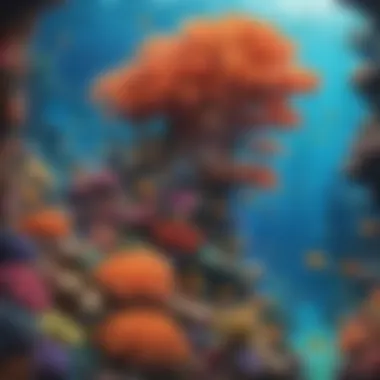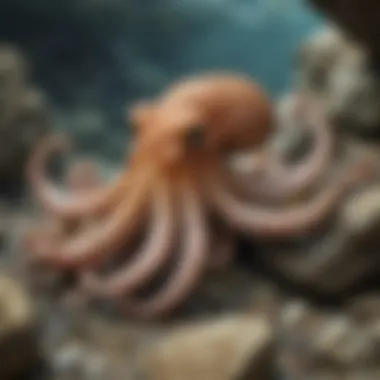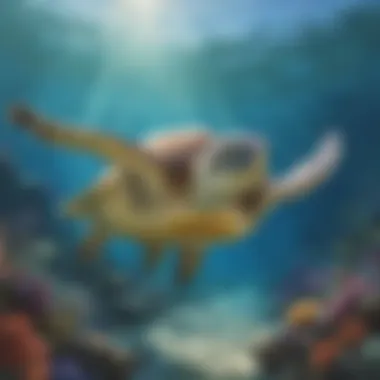Exploring Your Inner Sea Animal: A Deep Dive


Intro
Understanding oneself is complex. It often involves delving deep into our preferences and behaviors. One unique way to explore personality is by examining the traits of marine creatures. Sea animals exhibit fascinating characteristics that can reflect human behaviors. By investigating these correlations, we can find a new lens through which to view our identities.
This journey into the inner sea animal serves to enlighten the reader about both personal and marine life. The sea is filled with diverse creatures, each with specific traits. They can show us aspects of ourselves we may not consciously recognize. This article aims to merge psychology with biology, offering insights that are both educational and reflective.
Science Fun Facts
Marine life is astonishing, with countless intriguing facts. These facts not only spark curiosity but also make learning enjoyable. Here are some fascinating tidbits:
- The blue whale is the largest animal on Earth, weighing up to 200 tons and measuring nearly 100 feet long.
- Octopuses have three hearts and blue blood, which is quite different from humans.
- Some species of jellyfish are immortal and can revert to their juvenile form after maturing.
"Understanding the unique traits of marine life can help us learn about ourselves in surprising ways."
Interesting Trivia and Facts
Marine ecosystems are diverse. Each animal plays a role in its environment. For example, clownfish live among sea anemones, gaining protection from predators while providing food for the anemones. This relationship illustrates coexistence and mutual benefit in nature, reflecting how humans can form partnerships in their own lives.
Quirky Science Stories
There are stories about sea creatures that defy imagination. The immortal jellyfish, Turritopsis dohrnii, can revert to its earlier life stage, raising questions about aging and longevity. If humans had such abilities, how would that reshape our understanding of life? Such stories ignite curiosity and encourage further exploration of scientific subjects.
Amazing Science Records
In the world of marine biology, records abound. The largest fish is the whale shark, which can grow over 40 feet long. Such impressive dimensions prompt admiration and respect for the ocean's incredible biodiversity. These records encourage young minds to dream big and value the wonders of nature.
Thought-Provoking Questions
The journey into marine personality traits begs introspection. For instance:
- How might your characteristics relate to a particular sea creature?
- In what ways do you see yourself reflecting the creatures of the sea?
These questions stimulate critical thinking, encouraging readers to examine their identities through the lens of marine life.
Exploring the Wonders of Science
Science is all around us, especially in the natural world. Engaging with marine biology can ignite interest in scientific concepts. Understanding ocean life allows for a broader knowledge base.
Here are some ways to discover more:
Educational Videos and Animations
A wealth of visual resources exist to illustrate marine science. Platforms like YouTube offer documentaries on ocean life, making learning captivating for younger audiences.
Interactive Learning Tools
Interactive apps and websites provide opportunities for hands-on exploration. Tools such as marine life simulations allow students to engage directly with the subject matter.
Real-Life Applications of Science
Marine studies impact everyday life. For example, understanding marine ecosystems contributes to conservation efforts. This awareness can teach responsibility towards our environment, inspiring positive actions in young learners.
Science Quiz Time
Quizzes offer an interactive approach to learning. They can enhance retention of information through fun challenges.
Interactive Quizzes
Utilizing online platforms can lead to enjoyable learning experiences. Quizzes can assess knowledge on marine life and personalities.
Multiple Choice Questions
- What is the fastest sea animal?
a) Sailfish
b) Dolphin
c) Shark - How many hearts does an octopus have?
a) One
b) Two
c) Three


Brain Teasers and Puzzles
Incorporating puzzles related to marine creatures encourages deeper engagement with the learning material. They challenge thought and foster problem-solving skills.
Science Experiment Showcase
Experiments bring theory to life. Simple activities related to marine biology can be conducted at home or in classrooms.
Fun and Engaging Experiments
Simple experiments, like observing how salt affects plant growth, can illustrate the principles of marine ecosystems and conservation.
Step-by-Step Instructions
- Collect materials:
- Plant the seeds in both containers.
- Water one with saltwater and the other with fresh water.
- Observe the results over time.
- Small plants
- Salt
- Water
- Two containers
Safety Tips and Precautions
Always supervise experiments with children. Ensure materials are safe and age-appropriate. This safety practice fosters a secure learning environment.
Preamble to Sea Animals
Understanding sea animals opens a door to a remarkable world of diversity and complexity. Marine life showcases an array of species that vary in form, function, and behavior. This article highlights why exploring sea animals is essential.
The knowledge of these creatures extends beyond just biological interest. It offers insights into ecosystems, and behaviors, and how they relate to human personality traits. By studying these animals, we not only learn about biodiversity but also acquire a deeper understanding of ourselves.
Through this exploration, readers can discover parallels between their own traits and those of marine life. The journey invites individuals to reflect on their characteristics thus enriching their self-knowledge. Moreover, recognizing the beauty of the underwater world fosters a sense of responsibility towards conservation.
The Diversity of Marine Life
Marine life is incredibly diverse, ranging from microscopic plankton to massive whales. Approximately 230,000 marine species have been identified, with estimates of unclassified species reaching millions. This vastness is fascinating. Different species adapt uniquely to their environments, which can teach us valuable lessons on adaptability and resilience.
Some common categories of marine life include:
- Fish: From tiny clownfish to great white sharks. Each fish displays various behaviors and traits.
- Mammals: Dolphins and whales showcase intelligence and complex social structures.
- Invertebrates: This group includes jellyfish and octopuses, known for their unique survival mechanisms.
The immense variety of sea animals reflects nature's creativity. Observing these differences can encourage curiosity and instill a desire to learn more about our oceans.
Why Sea Animals Fascinate Us
Sea animals spark fascination for numerous reasons. One compelling factor is their mystery. Much of the ocean remains unexplored, leaving room for wonder about what lies beneath the surface. The challenge of understanding these creatures encourages exploration.
Additionally, marine animals often symbolize various traits we admire. For instance, dolphins are associated with playfulness, while sharks evoke strength and fearlessness.
Fascination can also arise from personal experiences. Visits to aquariums or marine parks can ignite interest from an early age. Such encounters often create lasting memories and connections to the sea.
Connecting Personality Traits with Sea Animals
Understanding the connection between personality traits and sea animals is essential for a meaningful exploration of our inner selves. This section serves as the foundation for examining how certain characteristics of marine life can mirror human behaviors and personalities. By drawing parallels between ourselves and the diverse sea creatures, we open doors to self-discovery. Such insights can foster emotional intelligence, enhance relationships with others, and promote a deeper knowledge of nature.
The examination of personality traits in relation to sea life can reveal surprising benefits. For instance, recognizing your inner sea animal may encourage reflection on personal strengths and weaknesses. It can also inspire empathy toward marine life and a sense of responsibility for conservation efforts. Understanding oneself through the lens of aquatic beings might instill a greater appreciation for biodiversity, igniting a curiosity that can be passed down to young minds.
Understanding Personality Psychology
Personality psychology posits that our traits influence how we think, feel, and act. This branch of psychology helps explain why individuals may respond differently to similar situations. By exploring various theories, such as the Big Five personality traits—openness, conscientiousness, extroversion, agreeableness, and neuroticism—we can begin to map these characteristics onto sea animals. For instance, dolphins, known for their playful and social nature, might resonate with people who are extroverted and open to new experiences. In contrast, the solitary and complex behavior of octopuses could connect with those who are introspective or creative.
Moreover, understanding these traits can facilitate discussions with children about personality. It can guide them in recognizing and valuing the differences in themselves and their peers. Engaging with sea animals can help simplify complex ideas, making them more accessible and relatable.
The Link Between Nature and Personality
Nature has a profound impact on our personalities. Studies suggest that interactions with the natural world can shape our behaviors and preferences. This connection extends to the ocean and its inhabitants. For instance, children exposed to marine environments often show increased curiosity about life forms, fostering a sense of wonder that enriches their development.


The link between the characteristics of specific sea animals and human personality traits also highlights how we can learn from these creatures. For example, the perseverance of sea turtles can inspire resilience in those facing challenges. Similarly, the adaptability displayed by clownfish may encourage problem-solving skills.
In educational settings, discussing these links can prompt children to consider how they relate to marine life. They can begin to see themselves in the traits of these creatures, which can lead to personal growth and enhanced self-awareness.
"By reflecting on our connection to sea animals, we engage not only in self-exploration but also in a journey towards understanding and protecting the marine ecosystems that nourish our planet."
In summary, exploring the interplay between personality traits and sea animals provides valuable insights into our own behaviors. This awareness can enrich our lives and nurture a sense of curiosity about the world around us. In the forthcoming sections, we will delve further into the key characteristics of popular sea animals, examining how they align with human traits, and ultimately guiding our journey of self-discovery.
Key Characteristics of Popular Sea Animals
Understanding the key characteristics of popular sea animals can greatly enhance one's journey into self-discovery and personal reflection. Each selected animal provides unique traits that resonate with human behaviors and emotions. For instance, examining these relationships can inspire individuals to identify qualities in themselves, helping facilitate personal growth and self-awareness. The characteristics of these animals can serve not just as a mirror for self-discovery, but also as a fascinating entry point into the study of marine biology and ecological importance.
Dolphins: Intelligence and Playfulness
Dolphins are often seen as one of the most intelligent and social creatures in the ocean. Their intelligence is remarkable; they can solve complex problems and use tools effectively. These cetaceans are known for their playful nature, frequently seen surfing on waves or engaging in acrobatics.
This playfulness extends to their interactions with humans, often creating strong bonds with those who observe them. For children, dolphins can serve as a great role model for teamwork and communication. They illustrate the value of social connections and the importance of mental stimulation through play.
Octopuses: Creativity and Problem-solving
Octopuses are renowned for their creativity and non-linear problem-solving abilities. With advanced cognition, these animals can navigate through mazes and escape from enclosures with skilful tactics. They exhibit behaviors that indicate an understanding of their environment and can adapt their actions successfully.
Their ability to camouflage is another testament to their creative nature. By changing color and texture, they can blend into diverse backgrounds, illustrating the significance of adaptability. Children can learn from octopuses the beauty of thinking outside the box and the importance of flexibility in life's challenges.
Sharks: Strength and Fearlessness
Sharks represent strength and fearlessness in the marine world. Known as apex predators, they have exceptional hunting skills and a strong sense of responsibility for maintaining ocean balance. Their powerful physiques complement their reputation, making them symbols of resilience.
For young learners, sharks can embody the courage needed to face challenges head-on. Understanding their role in ecosystems can also instill a deeper respect for marine life. Teaching children about sharks fosters a sense of empowerment and encourages them to confront their fears.
Sea Turtles: Perseverance and Longevity
The seemingly slow-moving sea turtle epitomizes perseverance and longevity. These creatures show impressive determination in their migratory journeys, sometimes traveling thousands of miles to reach nesting sites. Their ability to live for decades emphasizes the importance of a slow, steady approach to life.
By observing sea turtles, children can appreciate the significance of patience and commitment. Turtles remind us that success takes time, and that resilience contributes to achieving long-term goals.
Clownfish: Community and Adaptability
Clownfish embody community and adaptability through their relationships with sea anemones. They establish symbiotic partnerships that protect them from predators while providing nourishment to the anemones. Clownfish live in family groups, showcasing the strength and security of community living.
For kids, clownfish can represent the value of teamwork and collaboration. Their adaptability to different habitats can inspire children to embrace change and develop social skills. Clownfish demonstrate that thriving in a dynamic environment is possible when working together.
By exploring these sea animals, individuals gain valuable insights into their own personalities and may identify qualities that resonate with them in daily life.
Identifying Your Sea Animal
Identifying your sea animal is a key part of this journey. This section encourages you to explore your inner self through the characteristics of various marine creatures. Understanding which sea animal reflects your personality traits can lead to increased self-awareness. It helps us connect more deeply with nature and its inhabitants. This connection can inspire curiosity about marine life and motivate environmental stewardship.
Reflection on Personal Traits
Reflecting on personal traits is the first step in identifying your sea animal. Take a moment to think about who you are. Consider how you react in different situations. Do you tackle challenges head-on, or do you prefer a more cautious approach? These reflections help reveal patterns in your behavior, which can align with different sea animals.
Here are some questions to consider:
- What are your strengths and weaknesses?
- How do you handle stress?
- Do you thrive in teamwork or prefer solitude?
The answers to these questions can illuminate your personality. For example, a person who is adventurous and loves social interaction might relate to dolphins, while someone who values independence and creativity could identify with an octopus. Reflecting on these attributes allows you to recognize traits that may resonate with specific sea animals.
Assorted Questionnaires and Assessments
Assorted questionnaires and assessments can simplify the identification process. Different tools are available to guide you on this journey. These typically consist of a series of questions or scenarios that ask about your preferences, behaviors, and reactions. You can find simple quizzes online that align with each sea animal described in this article.
Here are types of assessments to look for:


- Personality Quizzes: These often correlate traits with marine animals and help you discover your match.
- Interactive Assessments: Some resources provide interactive experiences to determine your sea animal.
Engaging with these tools can provide clarity on how you might connect with certain creatures. This can unlock new insights into your inner self and lead to personal growth. Having a clear idea of your sea animal can also enhance your appreciation for marine ecosystems.
"Understanding your inner sea animal can lead to profound insights about yourself and your connection to the natural world."
The Scientific Perspective on Sea Animals
Understanding sea animals from a scientific standpoint provides deeper insights into their roles in the ecosystem. This perspective helps readers appreciate the complexity and beauty of marine life. Such knowledge can inspire curiosity and a desire to learn more. Moreover, recognizing the scientific elements behind marine animals can lead to a better personal connection with these creatures.
Biological Importance of Marine Ecosystems
Marine ecosystems play a crucial role in the planet's health. They are home to a vast range of creatures, from the smallest plankton to the largest whales. These ecosystems offer essential services, such as:
- Oxygen production: Phytoplankton can produce 50% of the world's oxygen.
- Carbon absorption: Oceans absorb a significant portion of carbon dioxide, helping to mitigate climate change.
- Biodiversity: Many sea animals are part of a food web, supporting life both in the ocean and on land.
Studies indicate that marine ecosystems influence global weather patterns and support human economies through fishing and tourism. Protecting these systems is vital not just for sea life, but for human well-being too.
"The health of our oceans is a reflection of our own health on land."
Conservation Challenges Facing Marine Life
Despite their importance, many marine ecosystems face severe threats. Key challenges include:
- Pollution: Plastics and chemicals contaminate oceans, impacting marine life.
- Overfishing: Unsustainable practices lead to diminished fish populations, affecting biodiversity.
- Climate Change: Rising sea temperatures and ocean acidification disrupt marine habitats.
Addressing these challenges requires collective action. Awareness and education about marine conservation are essential, helping individuals understand their impact on the environment. This can foster a sense of stewardship and care for the oceans.
Engaging with Sea Animals through Education
Engaging with sea animals through education offers a unique opportunity for deeper understanding. It combines the excitement of marine life with valuable learning experiences. By studying sea animals, individuals can uncover connections between personality traits and the characteristics of these fascinating creatures. This exploration fosters self-awareness and provides insights into human behavior. Moreover, the process encourages curiosity about the natural world, promoting a lifelong interest in science and ecology.
Interactive Learning Tools and Resources
Interactive learning tools are essential for making the study of sea animals engaging. These resources can include:
- Educational Videos: These visually compelling materials can present marine life in action, showcasing behaviors and environments.
- Virtual Reality Experiences: VR allows students to immerse themselves in underwater ecosystems, exploring coral reefs or the depths of the ocean.
- Online Games and Quizzes: Fun and informative, these tools can test knowledge about sea animals and their habitats. They also make learning interactive, keeping students engaged.
When utilizing these tools, it's crucial to choose those that are suitable for the age and comprehension levels of students. Educational apps like SeaMap or MarineBio can offer tailored learning experiences.
Field Trips and Observational Learning
Field trips provide real-world exposure to marine life. Visiting aquariums or marine conservation centers can enrich the educational experience significantly. These trips allow students to:
- Observe sea animals up close, fostering a greater appreciation for their complexities.
- Engage in discussions with marine biologists or educators, gaining insights that textbooks alone cannot provide.
- Participate in hands-on activities, such as touch tanks, where they can experience the feel of different marine organisms.
Planning field trips requires thorough consideration of logistics and educational goals. It's critical to ensure that the trips align with curriculum objectives. Such experiences can ignite passion in students, motivating them to pursue further studies in marine biology or environmental science.
"Education is not just about learning facts; it’s about learning how to think. When students engage with sea animals, they learn more than science—they learn to observe, analyze, and care for the world around them."
In summary, integrating educational tools and real-world experiences enhances understanding of sea animals. This approach nurtures curiosity and fosters a desire to protect marine ecosystems.
Culmination: Integrating Insights into Daily Life
Understanding how sea animals reflect our personality traits serves as a powerful tool for self-discovery and personal development. This concluding section emphasizes how we can bridge knowledge about marine life with everyday experiences. The insights gained from our inner sea animal can guide us in various aspects of life, enhancing both self-awareness and interpersonal relationships.
Self-awareness and Personal Growth
Self-awareness is an essential aspect of personal growth. By connecting with a specific sea animal, we can uncover traits that resonate with us, revealing strengths and areas for improvement. For example, someone who identifies with dolphins may realize that they value playfulness and social connection. Conversely, an individual who relates to the octopus might embrace problem-solving skills and creativity.
Understanding these traits allows us to reflect on our actions and decisions. We can ask ourselves how our inherent characteristics shape our responses to challenges. With this knowledge, we can set personal goals aligned with our unique attributes. By focusing on strengthening specific traits, individuals may find that they evolve to achieve their full potential. This practice creates a cycle of growth that fosters resilience and adaptability in daily life.
Encouraging Curiosity about Marine Life
Fostering curiosity about marine life extends beyond personal reflection; it also connects us to the broader ecosystem. When we encourage children and ourselves to explore ocean creatures, we nurture a fascination for nature and its complexities. This inquiry can lead to a deeper appreciation for marine conservation and the necessity of preserving these vital ecosystems.
Engaging activities such as visiting aquariums, reading books about marine biology, or participating in beach clean-ups can spark interest in marine life. This curiosity can motivate us to learn more about significant issues like pollution and climate change, encouraging proactive behaviors that benefit our planet. By incorporating knowledge about sea animals into daily discussions, families can create a shared learning environment that promotes awareness and responsibility.
"The ocean stirs the heart, inspires the imagination, and brings eternal joy to the soul." – Wyland







